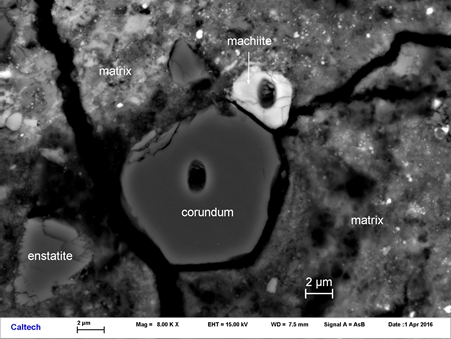
Machiite (IMA 2016-067), Al2Ti3O9, is a new mineral that occurs as a single euhedral crystal, 4.4 μm in size, intergrown with an euhedral corundum grain in a matrix of the Murchison CM2 carbonaceous chondrite. The mean chemical composition of holotype machiite by electron probe microanalysis is (wt%) TiO2 59.75, Al2O3 15.97, Sc2O3 10.29, ZrO2 9.18, Y2O3 2.86, FeO 1.09, CaO 0.44, SiO2 0.20, MgO 0.10, total 99.87, giving rise to an empirical formula (based on 9 oxygen atoms pfu) of
(Al1.17Sc0.56Y0.10Ti4+0.8Fe0.06Ca0.03Mg0.01)(Ti4+2.71Zr0.28Si0.01)O9.
The
general formula is (Al,Sc)2(Ti4+,Zr)3O9.
The end-member
formula is Al2Ti3O9. Machiite has the C2/c
schreyerite-type structure with a = 17.102 Å, b = 5.025 Å, c
= 7.058 Å, β = 106.6°, V = 581.3 Å3, and
Z = 4, as revealed by electron back-scatter diffraction. The calculated density
using the measured composition is 4.27 g/cm3. The machiite crystal is highly 16O-depleted
relative to the coexisting corundum grain (D17O
= ‒0.2±2.4‰ and ‒24.1±2.6‰, respectively; where D17O = d17O – 0.52×d18O). Machiite is a new member of the schreyerite
(V2Ti3O9) group and a new Sc,Zr-rich ultrarefractory
phase formed in the solar nebula, either by gas-solid condensation or as a
result of crystallization from a Ca, Al-rich melt having solar-like oxygen
isotopic composition (D17O ~
‒25‰) under high-temperature (~1575°C) and low-pressure (~10-4-10-5
bar) conditions in the CAI-forming region near the protosun. The currently
observed disequilibrium oxygen isotopic composition between machiite and
corundum may indicate that machiite subsequently experienced oxygen isotopic
exchange with a planetary-like 16O-poor gaseous reservoir either in
the solar nebula or on the CM chondrite parent body. The name machiite is in
honor of Chi Ma, mineralogist at California Institute of Technology, for his
contributions to meteorite mineralogy and discovery of many new minerals
representing extreme conditions of formation.
